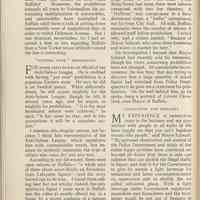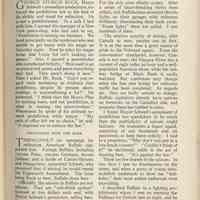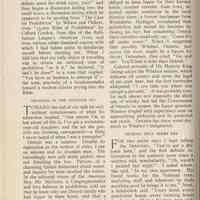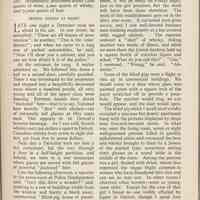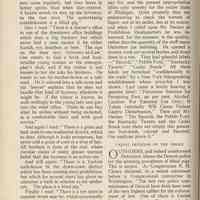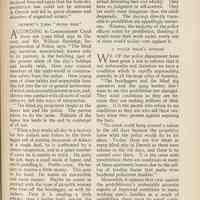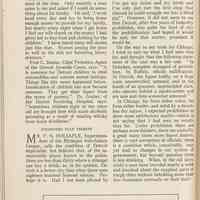Collections Item Detail
Article: Prohibition As It Is. 1. Hoboken-Buffalo-Detroit. By Rollin Lynde Hartt; in The World's Work, Jan. 1925.
2012.007.0067
2012.007
Lukacs, Claire
Gift
Museum Collections. Gift of a Friend of the Museum.
1924 - 1925
Date(s) Created: 1924, 1925 Date(s): 1924-1925
Good
Notes: Archives 2012.007.0067 Text of article as published in: The World's Work Vol. XLIX, No. 3, January 1925, pp. 265-272. Published by Doubleday, Page & Co., Garden City, N.Y. ==== [page 265] Prohibition As It Is I. HOBOKEN — BUFFALO — DETROIT Beginning a 3,000-Mile Trip on Which the World's Work Investigator Makes Some Observations on How Far the Dry Laws Affect These United States By ROLLIN LYNDE HARTT NEITHER as a "dry" nor as a "wet," but simply as a reporter anxious to learn how America is behaving under f prohibition, I have lately traveled three thousand miles. When people asked me, "What are you trying to prove?" I answered, "Nothing/' and I am not trying to "prove" anything now. I shall merely record things seen and heard by one roving New Yorker during the space of a month. As I stepped ashore at Hoboken, New Jersey, toward evening, at the outset of my journey, two drunken men reeled by — an extremely rare sight in these days. Then I noticed saloons, counting seventy-two in eight blocks. Among them glimmered the sign of a superb German restaurant, and there I dined. The restaurant, embellished with tall steins, seemed not to have changed since pre-Volstead days, nor had the beer, which is so fine a product that Mr. Hugh Fox, Secretary of the United States Brewers' Association, thinks it must come from overseas. As he believes, Hoboken, and not Rum Row, has been the great enemy of prohibition; while we are spending millions to embarrass Rum Row and other petty smuggling fleets, big liners dock at Hoboken "with the customs officers fixed, the Volstead agents fixed, the local police fixed." After dining, I visited saloons. They had the same swing doors, the same bars, the same brass rails, the same foaming seidels, the same German wall-mottos, the same pictures of pugilists and nude women, the same boisterous laughter, the same ejaculations of "Hoch!" as before prohibition. Any stranger could purchase beer and whisky. Policemen passed in and out, not objecting. Two crowded saloons, of the viler sort, had enormous free-lunch counters and offered beer at five cents a glass. Others demanded ten. A few asked fifteen. In one, I questioned the proprietor regarding Mr. Fox's theory. In so far as whisky was concerned, he indorsed it, adding, " They bribe even the gatekeeper." Alighting at Buffalo next morning, I [editors note in center box] The author of this series on prohibition enforcement was selected by the World's Work because of his wide experience in investigating controversial situations. He wrote articles for the magazine in 1923 and 1924 on the church war between modernists and fundamentalists, the Negro migration from the Southern states, and the divorce question. A native of Ithaca, New York, and the son of a Cornell University professor, he was graduated from the Andover Theological Seminary in 1896 and became a Congregational minister, holding pastorates in Helena, Montana, and Leverett, Massachusetts, during the two ensuing years. He has written for magazines and newspapers regularly, and has been on the staffs of the Boston Transcript, Chicago Tribune, and the Literary Digest. Among his books are " Understanding the French" and "The Man Himself—the Nazarene "—The Editors. end page 265 266 --- Liquor in Buffalo hardly knew the place. Since prohibition, splendid new buildings had shot up everywhere, obscuring old landmarks. As the Methodist Clip sheet calls the revival of building a result of prohibition, what city should be drier than Buffalo? Moreover, the prohibition manuals all trace to Volsteadism the astonishing multiplication of automobiles, and automobiles have multiplied in Buffalo until there is talk of cutting down interminable rows of magnificent elms in order to widen Delaware Avenue. But I was skeptical, nevertheless, for I had received a hint or two regarding Buffalo from a New Yorker whose attitude toward the law is interesting. "Putting Over" Prohibition FOR seven years he was an official of the Anti-Saloon League. He is credited with having "put over" prohibition in a populous Eastern state. He says he did it on Swedish punch. When sufficiently drunk, he still argues mightily for the Anti-Saloon League, though he left it several years ago, and he argues as mightily for prohibition. " It is the most beneficent reform ever achieved," he says; "it has come to stay, and in two generations it will be a complete success." I mention this singular person, not because I think him representative of the Anti-Saloon League, which repudiates him with commendable wrath, but because he perfectly represents the type of citizen who votes dry and acts wet. According to my informant, there were open saloons in Buffalo — "a whole nest of them about seven blocks up Broadway from Lafayette Square"— and the story turned out to be true. I found them selling beer but not whisky; indeed, the only spirituous liquor 1 came upon in Buffalo was the crtme de menthe offered me, in a home, by a recent graduate of a famous Eastern university. He had obtained the formula in the university laboratory, where, by diligent experimentation, he and a group of classmates became very successful university distillers and bootleggers, although the prohibitionists still assert, "A generation is growing up who will never know the taste of alcohol." But it was not alone in Broadway that saloons abounded. The whole of Buffalo's East Side had them. So did large areas of the West Side. While Main Street had none, there were saloons connected with two low theaters. A "Hofbrau" was conspicuous in a busy downtown street, a " buffet" conspicuous not far from City Hall. All told, Buffalo maintains twice the number of saloons it allowed itself before prohibition. I asked why, and a citizen replied: "Because of Mayor Schwab, who owns three breweries and wants to market his beer." On investigation I learned that Mayor Schwab had recently sold his breweries, though his views concerning prohibition have not changed. At considerable inconvenience (he was busy that day trying to discover how a large quantity of seized liquor had vanished from Police Headquarters) he gave me a statement for publication. On the wall behind him, as he spoke, hung a portrait of Grover Cleveland, once Mayor of Buffalo. Legislation and Morality MY EXPERIENCE of twenty-five years in the business and my connection with people in all walks of life have taught me that you can't legislate morals into people," said Mayor Schwab. My personal observation and control of the Police Department and study of the entire liquor problem have convinced me beyond all doubt that there is only one solution that can abolish the illegal traffic in liquor, and that is for the Government to give its people a light beverage for restaurant and home consumption under its supervision and to abolish the so-called soft-drink place. With a light beverage under Government regulation, moonshine and home-brew and the bootlegger would be put out of business in ninety days. Studying human nature for just a moment, all fair thinking people will agree that had the Government abolished whisky and left the people with a light beverage, gradually reducing its alcoholic content, there might have been 267 --- Prohibition As It Is a possibility of educating the human system and the younger generation in ten to fifteen years' time." WHAT HURTS THE PAWNBROKERS? GEORGE STURGIS BUCK, Mayor Schwab's immediate predecessor, enforced the prohibition law to the best of his ability and stood for reelection. He is not a prohibitionist. In a talk I had with him, I quoted the manager of a New York pawn-shop, who had said to me, " Prohibition is ruining our business. We lived principally on the workman who was unable to get home with his wages on Saturday night. Now he takes his wages home, and Uncle Sol isn't making expenses." Also, I quoted a pawnbroker who complained bitterly, " Men used to go on protracted sprees, and pawn everything they had. They aren't doing it now." Then I asked Mr. Buck, " Don't you regard such testimony as evidence that prohibition, despite its present shortcomings, is accomplishing a lot?" He answered, " I think that the Morris Plan for making loans, and not prohibition, is what is ruining the pawn-brokers." Whereupon he spoke of his attitude toward prohibition while mayor. "My oath of office left me no choice," he said. "It required me to enforce the law." FOREIGNERS VOTE FOR BEER Throughout his campaign for reelection, American Buffalo supported him. Foreign Buffalo, including 150,000 Poles, 100,000 Germans, 60,000 Italians, and a horde of Czecho-Slovaks and Hungarians, supported Schwab, who promised that, if elected, he would repeal the Eighteenth Amendment. The issue being Buck or beer, Buffalo chose beer. Officially, the saloons in Buffalo are not saloons. They are "soft-drink parlors" licensed at five dollars each and, with Mayor Schwab's permission, selling beer. On the East Side, it is a mild beer, though frankly illegal. The West Side has a much stronger beer, though no one seemed the worse for it. The supply is said to come from Pennsylvania. Meanwhile, various brands of ale — among them Carlin's, Black Horse, Frontenac, and a keg ale containing 12 per cent — come from Canada. Cottagers on the Canadian shore opposite Buffalo observe tell-tale wagon-tracks running down into the lake. For the rich, even whisky comes. After a series of heart-breaking thefts from cellars, rich Buffalonians mounted electric lights on their garages with reflectors brilliantly illuminating their back yards. "Booze lights" these are called. I saw hundreds of them. The relative scarcity of whisky, with Canada so near, puzzles one at first. It is at the same time a great source of pride to the Volstead agents. From the rum-runners' standpoint, however, Canada is not near; the Niagara River has a current of eight miles an hour and a well-populated American shore, while the railway bridge at Black Rock is easily watched. But conditions may change when the fine new bridge for vehicular traffic has been completed. As regards ale, they are fairly certain to change; Buffalo capitalists already have options on breweries on the Canadian side, and property there has trebled in price. I found Mayor Schwab's annulment of prohibition less scandalous in its result than the multiplicity of saloons might indicate. He maintains a liquor squad, consisting of one lieutenant and six patrolmen, to keep them orderly. I said to a proprietor, "Why don't you put in a free-lunch counter?" "Couldn't think of it!" he exclaimed, while in the act of drawing beer. "It's against the law." There are few brawls in the saloons. In two days I saw no drunkenness on the street, and when a party of young auto-mobilists undertook to show me "hellholes," their most ardent endeavors were unavailing. I described Buffalo to a fighting prohibitionist whom I met on entering the Pullman for Detroit late at night, and he said, "The cities are wet, but the towns are dry; I go everywhere,and the only trouble is with the cities." I answered, "More than half the people of the United States now live in cities." He retorted, "Well, anyhow, you can't say prohibition was 268 ---- No Drunkenness on the Streets 'put over'; almost the whole territory of the United States was dry before the Amendment, and almost the whole population of the United States was living in dry territory.'"I asked him, "Then where and by whom were two billion dollars spent for drink every year?" and thus began a discussion lasting into the small hours, a discussion during which he appeared to be quoting from "The Case for Prohibition" by Wilson and Pickett, from "35,000 Miles of Prohibition" by Gifford Gordon, from files of the Anti-Saloon League's American Issue, and from various other standard sources with which I had taken pains to familiarize myself before starting out. When I told him that my only object in traveling was to obtain an unbiased view of prohibition "as it is," he declared, "It can't be done!" in a tone that implied, "You have no business to attempt it"— the tone, precisely, of a fundamentalist toward a modern scholar prying into the Bible. DRINKING IN THE YOUNGER SET TOWARD the end of our talk he said, without consciousness of what his admission implied, "One reason I'm so hot about all this is, I 've got a seventeen-year-old daughter, and the set she goes with are drinking outrageously—a thing I never heard of when I was a youngster." Detroit was a surprise. Despite its reputation as the wettest of cities, I saw no saloons and no drunken men. The exceedingly rare soft drink parlors were not breaking the law. Patrons of a charming Italian restaurant drank water, and inquiry for wine shocked the waiter. In the editorial rooms of the American Boy, Mr. McGuire, a Congregationalist and firm believer in prohibition, told me that he knew only one Detroit family who had liquor in their home, and that a family from New York, who provided punch at a party, were looked upon with deep disapproval by their guests. As for drunkenness on the street, he observed it only about once a month. At the office of the Anti-Saloon League, the young woman in charge said that she "lived in a bad neighborhood" and saw a drunken man "every other week." Around the hotels I met travelers who came often to Detroit. A Nebraskan testified that Omaha was wet and dry by turns, and that Nebraska farmers were obliged to keep liquor for their harvest hands; another traveler, from Iowa, reported similar conditions in the rural districts there; a former inn-keeper from Wyandotte, Michigan, complained that prohibition had ruined his business by closing his bar; but concerning Detroit these outsiders could only say, "Guess it's all under cover." When I suggested that possibly Windsor, Ontario, just across the river, might be a haven for thirsty Detroiters, they cried, "Go and see! You'll find it drier than Detroit." Colored portraits of His Majesty King George adorn the Windsor saloons, which welcome all comers and serve the legal 2 1/2 per cent, beer, but the first bartender whispered, "I can take you where you can get 9 per cent." It was probably true, for such abuses and especially the illicit sale of whisky had led the Government of Ontario to reopen the liquor question. Windsor tingled with expectancy over an approaching plebiscite and its predicted wet result. Ontario has since voted dry, much to Windsor's indignation. DETROIT ONLY SEEMS DRY FOR two entire days I kept telling the Detroiters, "You've got a dry town here," and the first definite information to the contrary came when a waitress said, nonchalantly, "Oh, wasn't I pickled last night!" I asked where. She said, "In my own apartment. My friend works for the Volstead men, analyzing stuff, and whenever he finds anything good he brings it to me." Next, a hotel-clerk said, "Every hotel, every apartment house, every rooming house has booze." Then a business man said, "It's sold even in butcher shops and candy shops." Moreover, the Detroit papers told of a great enforcement drive then in progress. Seventy-two hours it lasted, with police working over-time in two platoons instead of three and making 269 ---- Prohibition As It Is hundreds of arrests in scores of hidden distilleries and blind pigs. There were sixty arrests for drunkenness, proving, not that drunkenness is a common thing in Detroit, but that Detroit is a big city. Incidentally, policemen seized 1,000 quarts of wine, 5,000 quarts of whisky, and 75,000 quarts of beer. SEEING THINGS AT NIGHT LATE one night a Detroiter took me about in his car. In one street, he remarked, "These are all houses of prostitution"; in another, "This is the 'coke' district"; and when we came to a long row of parked automobiles, he said, "Now I'll show you a cabaret, and you can see how afraid it is of the police." At the entrance, he rang. A waiter admitted us. We followed him down a hall to a second door, carefully guarded. There I was introduced to the proprietor and stepped into a beautifully decorated room where a hundred people, all very young and all of the upper class, were dancing. Between dances they drank "doctored" beer—that is to say, Volstead beer heavily "shot" with alcohol — out of extremely tall glasses at fifty cents each. This appears to be Detroit's favorite beverage. As I was told, Scotch whisky costs ten dollars a quart in Detroit, Canadian whisky from seven to eight dollars, gin from five to seven dollars. Next day a Detroiter took me into a dry restaurant, led the way through a door in a half-height partition, and behold, we were in a wet restaurant where guests are served with tall glasses of powerful "doctored" beer. Late the following afternoon, a reporter in the press-room at Police Headquarters said, "Isn't this drive a wonder?" and, pointing to a row of buildings visible from the window and barely a block away, commented, "Blind-pig, house of prostitution, house of prostitution, blind pig, blind pig, blind pig." Another reporter, about twenty years old, said, "Come out drinking places—not a tenth of those he knew. One of them masqueraded as a laundry, with parcels of linen on a counter and a girl behind it. If you take your "laundry" there, it will be ready on Friday night, just as the girl promises, but the work will have been done elsewhere. The work of this establishment goes on in the dirty rear room. A curtained door gives access, and I saw well-dressed business men drinking moderately at a bar covered with ragged oilcloth. The reporter ordered a " shot" of whisky, risking another two weeks of illness, and while we were there the Jewish barkeep held up a square bottle of colorless liquor and asked, " What do you call this?" " Gin," I ventured. "Wrong," he said. "Absinthe." Some of the blind pigs were a flight or two up in commercial buildings. We would come to a door whose glass was painted green with a square inch of the paint scratched off to provide a peephole. The reporter would ring, an eye would appear, and the door would open. The blind pig which I recall most vividly occupied a spacious but dowdy apartment hung with the pictures displayed by shops near five-and-ten-cent stores. In what was once the living room, seven or eight well-groomed patrons lolled in gaudily upholstered chairs and consumed the beer and whisky brought to them by a Jewess of the market type, sometimes setting their glasses on a round table in the middle of the room. Among the patrons was a girl, flushed with drink, whose face expressed the vague fright common to women who have blundered into vice and can see no way out. In other rooms I observed other women—some as young, some older. Except for the case of that girl I found no one visibly affected by liquor in Detroit, though I spent four days there. HEARSES FILLED WITH LIQUOR MR. FRED GAERTNER, city editor of the Detroit News, has preserved in a scrapbook the articles on prohibition published by his paper a year 270 ---- Where Lay the Blame for Non-Enforcement? ago. Conditions have not changed, he says, and in that scrapbook I read: "There is an undertaking establishment in Detroit which has been doing a prosperous business and yet no corpse has ever been carried through its portals. Mourners come regularly, but they leave in better spirits than when they entered. A hearse wends its way up the driveway to the rear door. The undertaking establishment is a blind pig." Also I read: " There is a lawyer's office in one of the downtown office buildings which does a big business but which never had a case except it be either Scotch, rye, bourbon, or beer. The sign on the door says 'Attorney-at-Law.' One enters to find a brisk and businesslike young woman at the stenographer's desk, and if the visitor is not known to her she asks his business. He wants to sue his mother-in-law or a railroad. He is ushered into a side room and the 'lawyer' explains that he does not handle that kind of business, whatever it might be. If the visitor is known, he nods smilingly to the young lady and goes into the other office. There he can buy what he wishes without being molested, in a comfortable chair and with good service." And again I read: " There is a grain and feed store in one residential district, which to date, although it looks prosperous, has never sold a grain of corn or a wisp of hay. All business is done at the rear, where circular stains of many glasses warrant belief that the business is an active one." And still again: "There is a Turkish bath-house in the down-town district which has been running since prohibition, but which for several years has given no customer a bath in relation to his epidermis. The place is a blind pig." Finally I read: "There is a tire store in another street near by, which occasionally sells a tire, but which is usually just out of the kind you want. One might marvel at how a business so poorly conducted could exist. The place is a blind pig and the loads of tires which come in but never seem to go out, are in reality bottled goods and kegs." Confronted with such scandals as these, the uninformed will ask indignantly, "Where are the Volstead agents?" The answer is, "Right on the job — the few of them that exist." America can have all the Volstead agents it will pay for, and the present appropriation allots only seventy for the entire State of Michigan. Quite properly they are endeavoring to check the torrent of liquor, not at its outlet, but at its source; and when I called upon Mr. Decker at Prohibition Headquarters he was interested, for the moment, in the quality, rather than the quantity, of the stuff many Detroiters are imbibing. He opened a drawer, took out several bottles, and stood them in a row. They had splendid labels —" Bacardi," " Pebble Ford," " Kentucky Tavern," "Cedar Brook." All these labels are furnished "confidentially to the trade" by a New York lithographing establishment whose price-list I was shown. Last came a bottle bearing a genuine label: "Parisienne Solution for Perspiring Feet, 90 per cent. Alcohol. Caution: For External Use Only; If Taken Internally Will Cause Violent Gastric Disturbances." Then said Mr. Decker, "The Bacardi, the Pebble Ford, the Kentucky Tavern and the Cedar Brook over there are simply this poisonous foot-wash, colored and flavored. Our analyses prove it." UNJUST CRITICISM OF THE POLICE OUTSIDERS, and indeed uninformed Detroiters, blame the Detroit police for the amazing prevalence of blind pigs. This is unjust. As Congressman R. H. Clancy declared, in a recent statement before a Congressional committee in Washington, "The last two police commissioners of Detroit have both been men of the very highest caliber for the enforcement of law. One of these is United States Senator James Couzens, who labored several years as police commissioner and as Mayor of Detroit to enforce the prohibition law. He had been a strong dry advocate, but finally, after deep study and wide experience, he announced himself an advocate of amending the Volstead 271 ---- Prohibition As It Is Act. The other police commissioner is Frank Croul, one of Detroit's big business men, a banker and manufacturer, opposed to all political machines and running the Police Department on a strictly merit and efficiency basis. Both Couzens and Croul declared time and again that the bone-dry prohibition law could not be enforced in Detroit and led to grave diseases and disorders of organized society." Detroit's 7,000 "Blind Pigs" ACCORDING to Commissioner Croul there are 7,000 blind pigs in Detroit, and Mr. William Rutledge, Superintendent of Police, says: "The blind pig, secretive, unrestricted, known only to its patrons, is the hatching spot of the greater share of the city's holdups and bandit raids. Here may consort members of the underworld in comparative safety from the police. Here young men of clean habits and respectable families fall into the air of general lawlessness of which such an establishment savors, and, thrown into contact with all sorts of social outcasts, fall into ways of temptation. "The blind pig proprietor laughs at the liquor law and the police. The patron learns to do the same. Ridicule of the liquor law leads in the end to contempt of all law. "When a boy works all day in a factory for five dollars and listens to the bootlegger tell of making thousands of dollars in a single deal, he is confronted by a severe temptation, and in a great number of cases he is unable to resist. He quits his job, buys a small stock of liquor, and starts peddling it. Profits come. He begins to receive a little money. This goes to his head. He wants an automobile and more money. Maybe he comes in contact with the type of parasitic woman who lives off the bootlegger, or with hijackers. First it is stealing a little whisky, then a bolder theft, maybe, the holding up of a blind pig, where the occupants dare not complain, and finally, drawn by the lure of more money, the hoy becomes a bandit." Commissioner Croul himself says: Prohibition has brought about a condition menacing the life of every police officer. Heavily armed thugs roam about the city ready to shoot, and do shoot, not only at the slightest attempt at interference by patrolmen, but sometimes just viciously. Boys in their teens go about heavily armed delivering beer and whisky. They have no judgment or self-control. They are really more dangerous than the adult desperado. The slayings directly traceable to prohibition are appallingly numerous. Whereas the majority of the police officers voted for prohibition, thinking it would make their work easier, every one of them would to-day vote against it. A Police Head's Opinion WE OF the police department have been given a law to enforce that is not enforceable and therefore we have a condition which is rapidly approaching anarchy in all the large cities of America. "The bootleggers and the blind pig operators and the gang leaders don't want to see this prohibition law changed. They want conditions as they are because they are making millions at their game. It is the people who refuse to see conditions as they are who aid these outlaws when they protest against exposing the facts. "No crook could hang around a saloon in the old days because the proprietor knew what the police would do to his place. To-day there are five times as many blind pigs in Detroit as there were saloons in the old days, and there is no control over them. It is the same with prostitution; there are conditions in many of these apartment houses due to the selling of bootleg booze that make even hardened policemen shudder." Meanwhile, it appears that, over against the prohibitionist's undeniably accurate reports of improved conditions in many working men's families as a result of prohibition, there must be noted conditions less gratifying. Thomas Dolan, superintendent of the Detroit City Welfare Commission, says: "Many families who never before applied for charity are regular callers now. The husband was drinking before, just as he is now, but 272 ---- Attractions of the Bootlegging Trade the rest of the family was not. Now they either make beer at home or have raw red liquor on hand all the time, and the wife who used to take in washing, while the husband was on a spree, to make ends meet, is now drunk with him most of the time. Only recently a man eame to me and asked if I could do something about his family. He said, 'I work hard every day and try to bring home enough money to provide for my family, but nearly every night when I get home I find my wife drunk on the money I had given her to buy food and clothing for the children.' I have heard many tell stories just like that. Women among the poor as well as the rich are becoming heavy drinkers." Fred C. Baxter, Chief Probation Agent of the Detroit Juvenile Court, says: "It is common for Detroit children to steal automobiles and commit armed holdups. Things like this never happened before. Intoxication of children has now become common. They get their liquor from the stores of parents." Dr. Gruber, of the Detroit Receiving Hospital, says: "Sometimes children eight or ten years old are brought here with acute alcoholic poisoning as a result of stealing whisky from home distilleries." STRANGERS STAY THIRSTY MR. P. N. HOLSAPLE, Superintendent of the Michigan Anti-Saloon League, calls the condition of Detroit deplorable, but believes that, of the innumerable places known to the police, there are less than thirty where a stranger can buy a drink; so, in his opinion, Detroit is a better city than when there were eighteen hundred licensed saloons. Perhaps it is. Had I not been piloted by professionsl [sic - professional] snoopers and plausibly introduced, I should have seen no drinking in Detroit, and I remember with some amusement a remark overheard in a hotel. A drummer was checking out. "Ain't it awful?" he groaned. "Here I've got my ticket and my berth and I've only just met the first chap that claimed he could smuggle me into a blind pig!" However, it did not seem to me that Detroit, after five years of bone-dry prohibition, was quite the kind of city the prohibitionists had hoped it would be and, for that matter, promised it would be. On the way to my train for Chicago, I tried to sum up what I had seen thus far, and thought that the following statement of the case was a fair one. "In Hoboken, complete disregard of prohibition. In Buffalo, official nullification. In Detroit, the liquor traffic, on a huge scale, uncontrolled, untaxed, and in the hands of an ignorant, unprincipled class, who operate behind a smoke-screen and are now and then so... [truncated due to length]
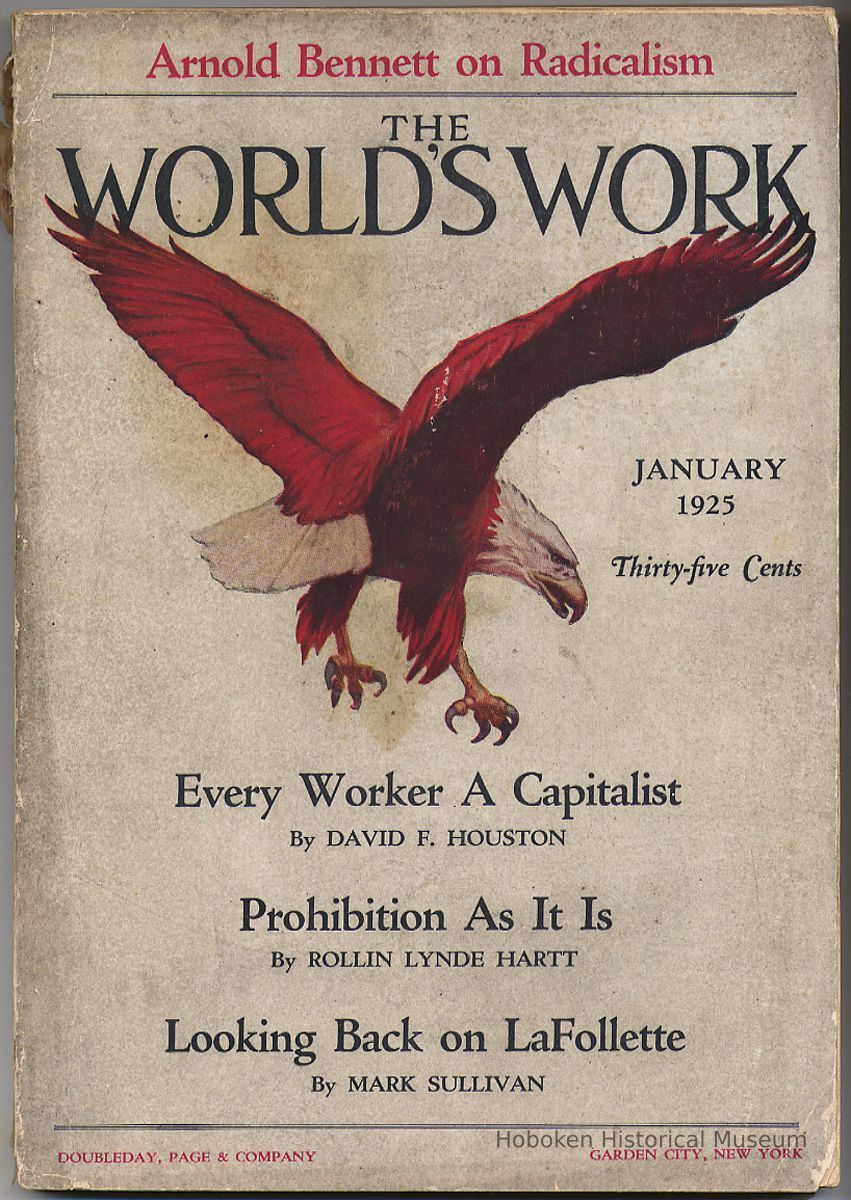

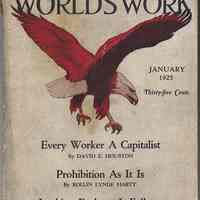
![pg [73] table of contents](https://d3f1jyudfg58oi.cloudfront.net/11047/image/e42313f0-fa82-11ed-a641-b3912f9925a9-uFdubaG.tn.jpg)
![pg [265] start of article: Prohibition As It Is](https://d3f1jyudfg58oi.cloudfront.net/11047/image/e5550440-fa82-11ed-a641-b3912f9925a9-uFducHl.tn.jpg)
